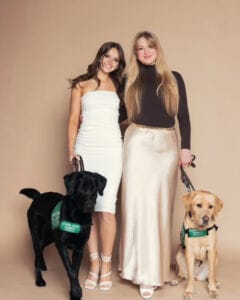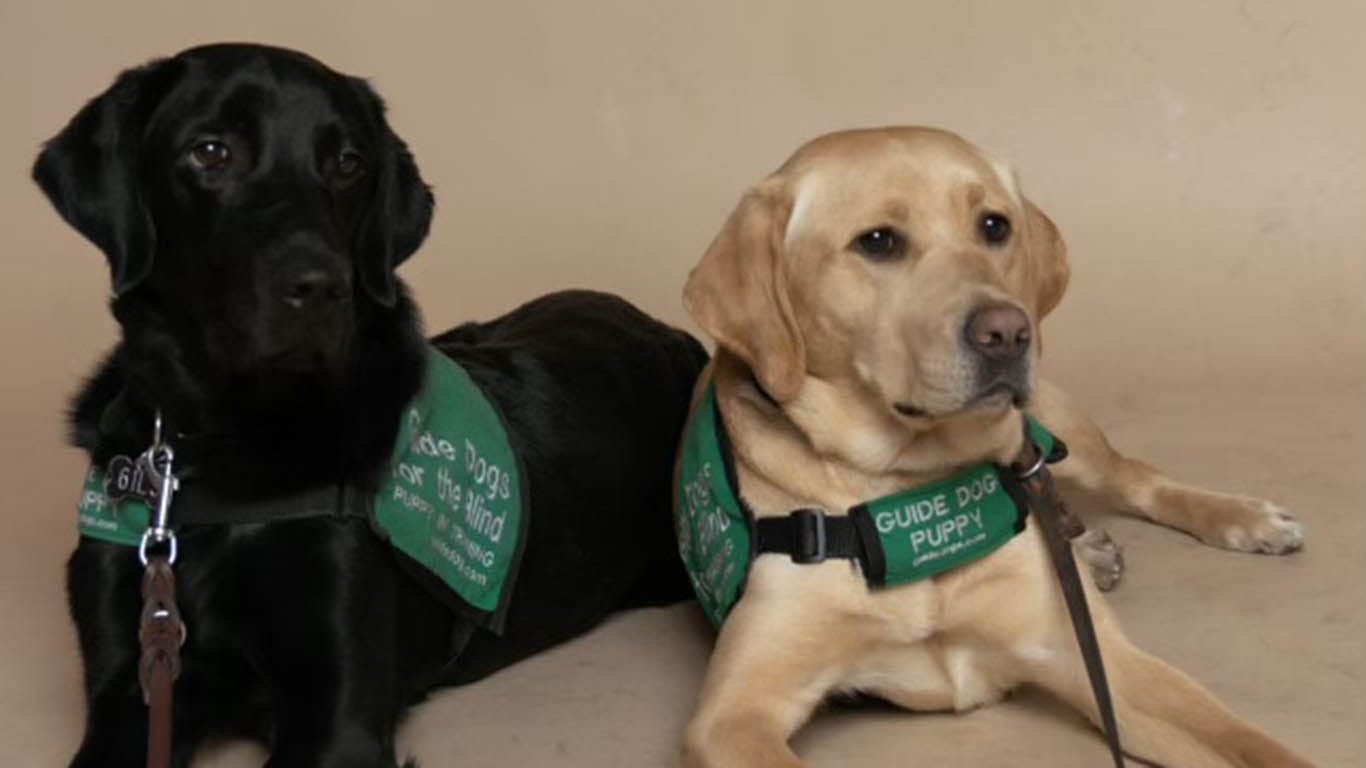Guide Dogs for the Blind is changing lives by providing dogs to individuals who are blind or visually impaired. Delta Gamma, a sorority at Arizona State University, contributes significantly to this program by raising breeder dogs that help change many people’s lives.
MORE NEWS: Top 5 dog names in Arizona and in the U.S.
Service for Sight is Delta Gamma’s national philanthropy, and the Arizona State chapter locally supports the Foundation for Blind Children and Guide Dogs for the Blind. Guide Dogs for the Blind was founded in 1942 by Lois Merrihew and Don Donaldson to help veterans who had been blinded in World War II. According to U.S. Service Animals, over one million people in the United States are legally blind, and guide dogs can be a lifeline for many of them.
Karl Seitz, who navigates life with vision impairments and numerous surgeries, found comfort in the companionship of Horton, a K9 buddy dog provided by Guide Dogs for the Blind.
Seitz had been struggling with vision impairments and surgeries, he has had 25 surgeries, including cornea transplants, to help improve his vision.
“We applied for a buddy dog because we knew a dog would help bring Karl companionship,”said Seitz’s mother.
That is when he found comfort in the companionship of Horton, a K9 buddy dog provided by Guide Dogs for the Blind.

Their family had lost two senior cats in late 2022, and Karl’s mother says he was having a hard time without a pet. “Animals have always been something that has helped ease anxiety and make him feel better on tough days. Horton has really brought us so much joy. He is such a well-behaved dog thanks to his puppy raisers from Guide Dogs for the Blind,” said Seitz’s mother.
The Seitz’s talked about how they loved spending time with Horton at the pool, the park, and the beach. Horton loves wading in the water, splashing around, and chasing his toys.
“Another huge benefit is that Guide Dogs for the Blind helps pay vet bills, so we do not have to worry financially about his care,” said Seitz’s mother.
The dog helps Karl navigate the world and perform daily tasks independently. They say Horton’s presence has been tremendously helpful in easing anxiety and providing emotional support. The family is grateful to Guide Dogs for the Blind, who trained Horton and helped pay his vet bills, ensuring he received the best care possible.
Reiley Robertson, the Vice President of Philanthropy for Arizona State’s Delta Gamma chapter, said initially nine dogs were chosen and the Delta Gamma’s or Sorority members now foster a number of others.
“In 2022, nine guide dogs were raised or co-raised by various women in our chapter, and we continue to have multiple dogs raised by multiple women throughout our chapter.”
“We are in charge of teaching the puppies the foundations of being a guide dog, so we teach them all of the basics before they go off to their guide dog campuses,” said Robertson.
The Delta Gamma chapter receives puppies when they are three months old and helps raise them until they are returned to the guide dog campus when they are 14 months old.
To become a guide dog raiser, one has to undergo a 10-hour in-person training course. Once the puppies arrive, weekly puppy kindergartens are held where the raisers work on puppy handling and gradually train them in the necessary skills they need.
This continues until they are roughly four months old, at which point the meetings become biweekly. The puppies and raisers undergo six-month, 12-month, and 18-month evaluations to check their progress. Together, the guide dog raisers work with the puppies to complete a series of tasks that they should be completing at that point in their lives.
If a puppy does not meet every benchmark, the raiser might receive recommendations to do ultra-specific things with the puppy to make up for the missing benchmark. The training is flexible and changes based on the puppy’s personality, strengths, and weaknesses.
Sorority members help socialize the dogs by taking them to classes and other campus activities involving large groups of people.
Once the dogs have completed the training their raisers have given them, they are sent to one of two campuses operated by Guide Dogs for the Blind. One is headquartered in San Rafael, California, and the other is in Boring, Oregon.
At these campuses, the dogs undergo an intense program that prepares them for their eventual pairing with a visually impaired individual.
They are then carefully matched with a professional trainer who collaborates with the dogs through eight levels of training until they are finally paired with a visually impaired individual who has applied for a guide dog.
The selection process ensures that the dog’s personality matches their new companion perfectly.
“Raising a guide dog is an incredible and unique experience that the Gamma Phi-Arizona State chapter of Delta Gamma can partake in,” said Robertson.
The sorority provides a structured and supportive environment for its member trainers to develop the necessary skills. It also offers resources such as training materials, workshops, and mentorship programs to help trainers improve their techniques.
Grace Medina is a college student with a black lab guide dog named Velvet. “She has been absolutely amazing. She has changed my life.”
Recipient guide dog owner Medina, who is entirely blind in her right eye and partially blind in her left eye, talked about how her dog has made my life joyful and free. Medina is about to graduate from the University of Oklahoma and reflects on how she is more independent with Velvet and has grown traits she did not partake in before.
“Guide Dogs for the Blind is my absolute favorite program,” said Medina.
Kayla Irvine is the Director of Fundraising for Arizona State Delta Gamma. She said sorority members also gain a lot from fostering the dogs.
“Being around the guide dogs has been the most eye-opening experience by gaining a deeper appreciation for the intelligence, training, and dedication required to become a guide dog,” said Irvine.
Irvine plans every fundraiser during Philanthropy Week, a week of fundraising events to support the sorority’s philanthropy. These events include “Delta Gamma Barbeque,” “Pizza for Paws,” and “Soda 4 Sight.”
This semester’s most recent philanthropy event at Arizona State raised more than $24 thousand.
“I love Service for Sight, and I cannot wait to continue to grow my love for this philanthropy,” says Irvine.
The journey starts with families like the Simonsons, who have been breeding dogs for over 15 years. Erik Simonson says it is not just a job but a fulfilling and meaningful journey.
According to the Guide Dogs for the Blind website, Labrador Retrievers have proven to be the most successful breed worldwide as guide dogs. Guide Dogs for the Blind constitute the largest percentage of the breeding colony. The organization also has fewer Golden Retrievers and Lab/Golden Crosses.
Simonson says, “Raising guide dogs for the blind is about raising a breeder dog that will have puppies that go on to help people in need.”




